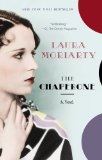Summary | Excerpt | Reading Guide | Reviews | Beyond the Book | Readalikes | Genres & Themes | Author Bio

The rain was coming down faster, rapping hard on the roof of the car.
Viola crossed her arms. "Well, if my girls do cut their hair, I can tell you now, it won't be so they can throw away hairpins. They'll do it to be provocative. To look provocative. That's what passes for fashion these days. That's what young people are all about now." She sounded suddenly stricken, more confused than indignant. "I don't understand it, Cora. I raised them to have propriety. But both of them are suddenly obsessed with showing the world their knees. They roll their skirts up after they leave the house. I can tell by the waistbands. I know they defy me. They roll their stockings down, too." She gazed out into the rain, lines branching beneath her eyes. "What I don't know is why, what's going on in their little heads, why they don't care about the message they're sending. When I was young, I never felt the need to show the general public my knees." She shook her head. "Those two cause me more grief than all four of my boys. I envy you, Cora. You're lucky to only have sons."
Maybe, Cora thought. She did love the very maleness of the twins, their robust health and confidence, their practical taste in clothing, their easy reconciliations after heated quarrels. Earle was smaller and quieter than Howard, but even he seemed capable of forgetting all worries when he held a racquet or a bat. She loved that they had both wanted to work on a farm, seeing it as an adventure in country living and physical labor, though she also worried they had no idea how much labor they'd signed on for. And she knew she had been lucky with her sons, and not just in the way that Viola meant. The Hendersons next door had a son just four years older than the twins, but those few years had made all the difference—Stuart Henderson had been killed in early 1918, fighting in France. Four years later, Cora was still stunned. For her, Stuart Henderson would always be a gangly adolescent, smiling and waving from his bike at her own boys, who were small then, still in short pants. Really, being lucky with sons seemed a matter of timing.
But whatever Viola said, Cora thought she might have fared just as well with daughters. She would have been good with girls, perhaps, using the right combination of instruction and understanding. Maybe Viola was just going about it the wrong way.
"I'm telling you, Cora. Something is wrong with this new generation. They don't care about anything important. When we were young, we wanted the vote. We wanted social reform. Girls today just want to... walk around practically naked so they can be stared at. It's as if they have no other calling."
Cora could hardly disagree. It really was shocking, how much skin girls were showing these days. And she wasn't some old prude or Mrs. Grundy; she was fairly sure she wasn't a wurp, though she didn't know what that meant either. Cora had been pleased when the hemlines moved up to nine inches from the ankle. Some leg showed, true, but that change seemed sensible: no more skirts trailing in the mud and bringing typhoid or who knows what into the house. And calf length was far preferable to the ridiculous hobble skirts that she herself had stumbled around in, all for the sake of fashion, not so long ago. Still, girls were now sporting skirts so short that their knees showed every time the wind blew, and there was no practical reason for that. Viola was right: a girl who wore a skirt that short just wanted to be looked at, and looked at in that way. Cora had even seen a few women her own age showing their knees, right here in Wichita, and really, in her opinion, these half-naked matrons looked especially vulgar.
Viola looked at her brightly. "That's one of the reasons I'm joining the Klan."
Cora turned. "What?"
"The Klan. Ku Klux. They sent a representative to the club last week. I wish you would have been there, Cora. They're very interested in women joining up, holding positions."
Excerpted from The Chaperone by Laura Moriarty. Copyright © 2012 by Laura Moriarty. Excerpted by permission of Riverhead Books. All rights reserved. No part of this excerpt may be reproduced or reprinted without permission in writing from the publisher.
Your guide toexceptional books
BookBrowse seeks out and recommends the best in contemporary fiction and nonfiction—books that not only engage and entertain but also deepen our understanding of ourselves and the world around us.